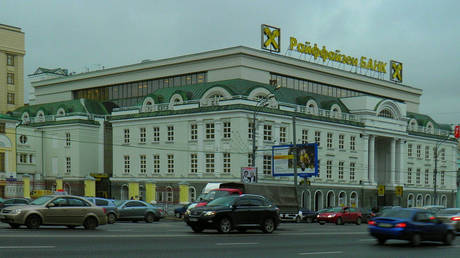
EU banks paying more Russian taxes since Ukraine conflict – FT
Raiffeisen, UniCredit and others with a presence in Russia have seen profits increase threefold since 2021
The largest EU-based banks operating in Russia saw profits soar last year and paid four times more in taxes than before the start of the Ukraine conflict, the Financial Times reported on Monday.
A number of foreign banks have left Russia since 2022 due to the West’s Ukraine-related sanctions. However, several lenders, including some from the Eurozone, opted to remain but reduced their operations. The European Central Bank (ECB) has been pressuring the remaining lenders to quit the Russian market.
Austria’s Raiffeisen Bank International (RBI), Italy’s UniCredit, Dutch lender ING, Germany’s Commerzbank and Deutsche Bank, as well as Italy’s Intesa Sanpaolo and Hungary’s OTP reported a combined profit in Russia of more than €3 billion ($3.2 billion) last year, three times more than in 2021, the FT wrote. The profits were partly generated by funds that the banks cannot withdraw from the country, the outlet explained.
The soaring income resulted in the EU banks paying about €800 million ($857 million) in taxes, up from €200 million in 2021, the Financial Times said, citing its own analysis.
More than half of the €800 million tax payments were made by RBI, which has the largest presence in Russia.
Read more
ECB pressuring banks to leave Russia
RBI’s profits obtained in Russia more than tripled to €1.8 billion between 2021 and 2023, the newspaper said. They now account for half of the Austrian group’s total profits, compared with about a third before the conflict, it added.
Regulatory restrictions imposed by the Russian government in 2022 prohibit dividend payouts from Russian subsidiaries to businesses from “unfriendly” Western countries.
“We can’t do anything with Russian deposits apart from keeping them with the central bank. So as interest rates went up, so did our profits,” said a senior executive at a European bank with a Russian subsidiary, as quoted by the FT.
The banks also require personal authorization by President Vladimir Putin for the sale of their Russian assets.
Raiffeisen said earlier this month that it was being pressured by the ECB to more rapidly reduce its presence in the sanctions-hit country.
READ MORE: Russia freezes assets of largest US bank
According to Reuters, the regulator is also planning to require UniCredit, Italy’s second-largest bank, to limit its business in Russia. The ECB has argued that doing business in the sanctioned country poses a reputational risk.
Raiffeisen and UniCredit, which have been operating in Russia for more than three decades, have attracted scrutiny from financial authorities in the US as well, sources told Reuters. Both banks play a crucial role in the Russian economy, enabling euro payments to and from the country. They are also the only foreign entities on the Russian central bank’s list of 13 systemically important credit institutions.
For more stories on economy & finance visit RT’s business section

